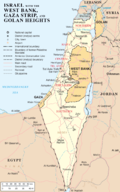
LGBT rights in the Palestinian territories
Encyclopedia

Israeli-Palestinian conflict
The Israeli–Palestinian conflict is the ongoing conflict between Israelis and Palestinians. The conflict is wide-ranging, and the term is also used in reference to the earlier phases of the same conflict, between Jewish and Zionist yishuv and the Arab population living in Palestine under Ottoman or...
. It remains one of the more taboo human rights issues in the region.
Criminal law and civil rights
Palestine has no specific, stand alone civil rights legislation that protects LGBT people from discrimination or harassment. The Basic Law of the Palestinian Constitution does, however, guarantee freedom of belief and expression, freedom of bodily integrity, freedom from discrimination "because of race, sex, color, religion, political views, or disability" and protection of human rights, all of which have served the basis of campaigns for explicit LGBT rights in other countries. However, hundreds of gay Palestinians have fled to Israel because the hostility they face in Palestinian-ruled areas. According to a 2010 compendium of laws against homosexuality produced by the International Lesbian, Gay, Bisexual, Transsexual and Intersex Association (ILGA), the decriminalization of homosexuality in the Palestinian territories is patchwork. On the one hand, same-sex acts were decriminalized in the Jordanian-controlled West Bank in 1951 and remain so to this day. On the other hand, in the Gaza Strip, the British Mandate Criminal Code Ordinance, No. 74 of 1936 remains in force and continues to outlaw same-sex acts between men, although lesbian women are not subjects of the code and their relations are thus, technically, not unlawful. In both cases, it is important to note that the Palestinian Authority has not legislated either for or against homosexuality - "on the legal level, the President of the Palestinian Authority issued his first decision on 20 May 1994 which provided that legislation and laws that were effective before 5 June 1967 in the West Bank and Gaza Strip would remain effective" - and, in line with almost all other Palestinian laws, the confused legal legacy of foreign occupation - Ottomanian, British, Jordanian, Egyptian and Israeli - continues to determine the erratic application or non-application of the criminal law of homosexuality in each of the territories. Because of this, in its indeterminacy, the legislative state of LGBT civil rights in Palestine is unexceptional from the majority of other laws, and discrimination owes as much to the provisional nature of the Palestinian Authority's civil powers and to the unsettled nature of the existence of Palestine as a territorial entity as it does to any judicial agenda or consistently pursued homophobic prejudices.Marriage and family
Same-sex marriages, civil unions or domestic partnerships are not given legal recognition in Palestine.Some LGBT Palestinians have fled, legally or illegally, mostly to Israel's urban centers, like Tel Aviv, seeking tolerance there. There are some reports of LGBT Arabs and Jews having relationships, thus breaking ethnic, religious and gender-based taboos. LGBT Jews and Arabs are among the least prejudiced people in the region, as seen by the cross-cultural relationships and the fact that gay bars are often a peaceful mixture of Arabs and Jews.
Media & cultural references
Several Israeli films and or television programs have dealt with the issue of LGBT Palestinians, oftentimes having relationships with LGBT Israelis. However, none of these films have been directed by LGBT Palestinians.- "Drifting" (1983) - First Israeli film to deal with LGBTLGBTLGBT is an initialism that collectively refers to "lesbian, gay, bisexual, and transgender" people. In use since the 1990s, the term "LGBT" is an adaptation of the initialism "LGB", which itself started replacing the phrase "gay community" beginning in the mid-to-late 1980s, which many within the...
themes features two Palestinian men, among the many people that the hero meets and interacts with while looking for love.
- "The Bubble (Ha-Buah)"The Bubble (2006 film)The Bubble is a 2006 romantic drama directed by Eytan Fox telling the story of two men who fall in love, one Israeli and one Palestinian...
(2007) - Two gay men, an Israeli and a Palestinian, face prejudice and other challenges while they date each other in Tel AvivTel AvivTel Aviv , officially Tel Aviv-Yafo , is the second most populous city in Israel, with a population of 404,400 on a land area of . The city is located on the Israeli Mediterranean coastline in west-central Israel. It is the largest and most populous city in the metropolitan area of Gush Dan, with...
.
- "Zero Degrees of Separation" - Explores the challenges facing same-sex couples in Israel when one of the partners is Palestinian or Arab.
AIDS/HIV
A Palestinian National AIDS/HIV Health program was established in 1998. Dr Ezzat Gouda is the current doctor to focus on sexually transmitted diseases for the Palestinian Ministry of Health. Reports claim that very few people have become infected since 1987, and those people who are infected face prejudice and shortages of medicine.In 2003 a report from the Palestinian Health Minister made some references to the infections, under "communicable diseases".
See also
- LGBT rights by country or territory
- Human rights in the Palestinian National AuthorityHuman rights in the Palestinian National AuthorityHuman rights in the Palestinian National Authority refers to the human rights record of the Palestinian Authority in the West Bank and Gaza. Since Israel's implementation of its unilateral disengagement plan in 2005 and the evacuation of all Jewish settlements from Gaza Strip, the Palestinian...
External links
- Asylumlaw.org: Sexual Minorities & HIV Status (Palestine) – various information packets used for asylum purposes

